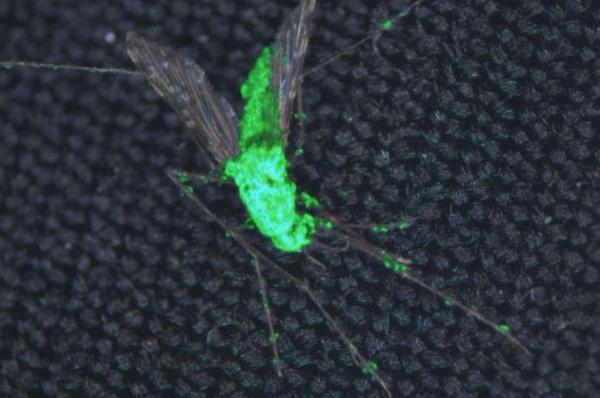Mosquitoes kill about 727,000 humans around the globe every year with various blood borne diseases like malaria so scientists have come up with a devilish method to destroy them.
A team of experts, lead by researchers from the University of Maryland, have engineered a GMO (genetically modified organism) fungus that is able to express multiple toxins that are able to kill mosquitoes.

A dead mosquito is seen covered in the new GMO fungus to produce spider and scorpion toxins. Photo by Brian Lovett/UMD
The researchers have developed a strain of mosquito-killing fungus Metarhizium pingshaensei, that they genetically modified with toxins from spiders and scorpions to make the fungi more deadly to two disease-carrying mosquito species Anopheles gambiae and Aedes aegypti.
This fungus penetrates the mosquito’s exoskeleton and gradually killing it from the inside out.
“Unlike chemical insecticides that target only sodium channels, many spider and scorpion toxins hit the nervous system’s calcium and potassium ion channels, so insects have no pre-existing resistance,” explains senior author Professor Raymond St. Leger.
They found that after five days after being infected by the GMO fungi, almost none of the mosquitoes infected could transfer malaria.
Brian Lovett, a graduate student in Maryland’s entomology department had said, “In this paper, we report that our most potent fungal strains, engineered to express multiple toxins, are able to kill mosquitoes with a single spore. We also report that our transgenic fungi stop mosquitoes from blood feeding. Together, this means that our fungal strains are capable of preventing transmission of disease by more than 90 percent of mosquitoes after just five days.”
“In conclusion, fungi can be genetically modified to strategically maximize their success as biocontrol agents13, 20. When their impact on malaria transmission is considered, transgenic fungi applied on sheets meet WHO standards for effective control of malaria within 5 days post-exposure, indicating that the inclusion of transgenic Metarhizium in pre-existing control efforts would effectively decrease malaria transmission.
Some female mosquitoes infected with transgenic fungi will lay eggs 3–4 days after a bloodmeal, so infected mosquitoes may still pass their genes onto the next generation, but infection will prevent further oviposition. Our study emphasizes the need to consider the effect of fungi on blood feeding for modeling of existing mosquito control techniques in conjunction with transgenic Metarhizium.”
The researchers said they implanted a genetic DNA switch in the fungus To keep the potent toxins from disseminating into the broader environment to ensure the expression of the toxins was only triggered once in the blood of an insect.
The study was detailed on Nature.com.
Original article posted on our sister site, MoldSafeSolutions.com

Moe is the founder of GnosticWarrior.com. He is a father, husband, author, martial arts black belt, and an expert in Gnosticism, the occult, and esotericism.








